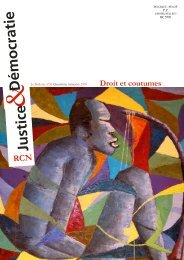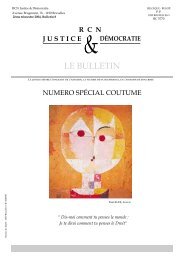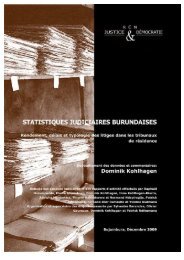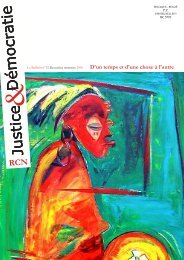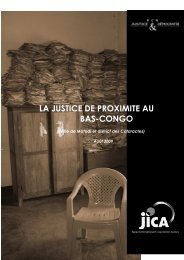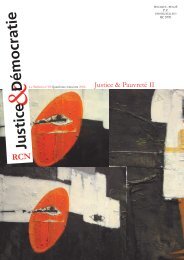Démocratie
extrait du bulletin n°25 - RCN Justice & Démocratie
extrait du bulletin n°25 - RCN Justice & Démocratie
Create successful ePaper yourself
Turn your PDF publications into a flip-book with our unique Google optimized e-Paper software.
Southern Sudan<br />
Southern Sudan, this emerging nation cannot afford to<br />
neglect its women.<br />
Current context<br />
During Africa’s longest running civil war, gender inequalities<br />
were exacerbated and women were further<br />
disempowered. This conflict produced seismic social<br />
changes which helped to foster a climate of impunity.<br />
One major change was the breakdown of family structures<br />
which traditionally offered protection both from<br />
outsiders and any errant extended family members.<br />
When many men went to join the SPLA and others fled<br />
their homes, women<br />
like Esther (1), now 36<br />
were left without their<br />
families and with no<br />
possibility of contacting<br />
them. Esther was<br />
married at 16 and is<br />
now a mother of four.<br />
The violence she had<br />
endured has led to miscarriage<br />
and two of her<br />
children died during<br />
the war. She explains:<br />
“When things became<br />
really difficult, I became<br />
trapped in an<br />
area controlled by the<br />
SPLA. My parents were<br />
in a government controlled<br />
area and I<br />
couldn’t reach them.<br />
My parents lived in<br />
Torit because my father<br />
was a politician and we<br />
children remained in<br />
our village of Loguli. As<br />
the fighting intensified,<br />
people began to<br />
leave Loguli for safer<br />
areas. Somehow I<br />
ended up remaining in<br />
the village – I don’t<br />
remember how because it was such a hectic and traumatic<br />
time. During the chaos, I was taken by some soldiers<br />
who forced me to be their cook and cleaner.”<br />
Photo : Jean Guy<br />
“For the first week, I was so afraid that they might<br />
rape me. I thought I was luckier than some of the<br />
young girls who had lost their families and ended up<br />
with the soldiers for protection. I would work all day<br />
looking after a group of soldiers, moving around with<br />
them and generally helping them with their work. I<br />
thought I was lucky because one of the soldiers had<br />
taken a liking to me and this kept me protected from<br />
other soldiers. I quickly accepted my situation, believing<br />
that I was at least physically safe. After a few months,<br />
this soldier told me he wanted to marry me. I said that I<br />
was too young and that my family would not approve.<br />
He told me that I had no choice – I needed protection<br />
and he needed a wife. He became aggressive and said<br />
that this is what I would have to deal with if I didn’t accept<br />
his so called protection. It was him or several other<br />
soldiers. So I agreed”.<br />
“That night when he tried to have sex with me, I refused<br />
and he beat me so badly that I could not work the<br />
next day. I can’t describe anything else because it’s too<br />
painful to remember. All I know is that I didn’t fight him<br />
again and he raped me almost every day”.<br />
“I now have four<br />
wonderful children<br />
but I am still married<br />
to this soldier, this<br />
man I hate because of<br />
what he put me<br />
through all those<br />
years. My family tell<br />
me that for the sake<br />
of the children, I need<br />
to stay with him. I<br />
love my children too<br />
much to deprive them<br />
of a father and the<br />
only security we have.<br />
The war took everything<br />
from almost<br />
everyone so my family<br />
can’t support me<br />
and the children. I<br />
have to stay until the<br />
children are old<br />
enough… the violence<br />
that began on<br />
my “wedding” night<br />
has never stopped.<br />
Beatings and rape<br />
have been the background<br />
of my exis-<br />
Croquis Toyi-Toti mama, Toos Van Liere<br />
tence. This is my marriage.<br />
Even my family<br />
can do nothing to help me; we didn’t choose my husband<br />
but now it’s too late. The only good thing is that<br />
since the war ended, my husband does not force me to<br />
have sex with him. Since we moved back to our family<br />
area of Loguli, I have my family close by. My father has<br />
many brothers. Having my uncles around presence<br />
means that my husband is afraid to beat me or force me<br />
to sleep with him. I don’t want to have any more children<br />
with him. Yet still I have to live with him and the<br />
memories of this life I am forced to share with him”.<br />
“I keep hope because I know that the Government of<br />
Southern Sudan wants to make things better for women<br />
here. Women are in parliament and our voices are being<br />
heard more and more through politics and organisations<br />
working with women. So, still I consider myself luckier





